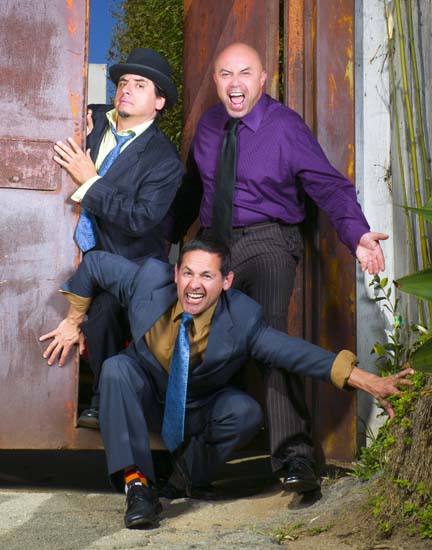No one knows better than college students that it’s hard to make relationships last. For those that stand the test of time, congratulations and celebration are a must. Culture Clash, just shy of turning 25, is a Latino and Chicano comedy and theater group whose long trajectory is to be celebrated Oct. 30 in Royce Hall.
The group is composed of three members: Ric Salinas, Richard Montoya and Herbert Sigüenza. Together they have written and performed a melange of works ranging from short sketches to full-length plays that explore broader social and political issues via satire.
Some of the first issues they explored were related to race and the Chicano and Latino experience on the West Coast.
“We thought that the name Culture Clash was not only the clash we feel as Latinos with mainstream America but also the culture clash we have within our own Latino nationality, like the differences between Puerto Rican and Cuban etc.,” Salinas said.
They have been pondering these issues while maintaining one thing intact: their unconventional style.
“It is physical and satiric, and sometimes it’s magic realism, and sometimes we are very realistic. We are very inspired by the Mexican muralists from the ’40s and ’50s,” Montoya said. “We paint the stage like a mural, so we try to use as many colors as we can, and as many bold statements, and subtle statements and music to challenge our audience to think.”
The bold and subtle statements are tightly intertwined with comedy and satire as a way to break down any walls the audience might have with certain issues.
“Comedy is the easiest way to educate an audience, at least to have them be open to hard issues such as immigration and racism,” Sigüenza said. “It’s a great way to disguise issues, make them a little more palpable so you’re able to digest them, hopefully take them home, and then after two hours you can start thinking about what we said.”
A concept that Sigüenza refers to as “time-release comedy” means the jokes remain in the audience members’ minds long enough for them to reflect on those issues after the show is over.
While the idea of sugarcoating strong issues with jokes and satire might seem detrimental to the deliverance of these subjects, the group has faith in their audiences and believes they come prepared to digest their material critically.
“We’re giving the audience credit that they’re going to walk away knowing what we’re doing,” Montoya said. “We can’t hit them over the head. It’s not a college lesson, it’s a life lesson; and in life there’s dark, and there’s light, and there’s humor, and there’s sadness all wrapped up within one hour of your life, so we just assume that the audience is equipped to deal with it.”
This connection with the audience is what has allowed them to extend beyond the Chicano and Latino experience and into an experience that is inclusive of almost every other societal group within the United States.
“We did plays called docudramas, and what we did (was interview) people of all kinds: black, Asian, gay, straight, Latinos. We started interviewing them and then telling their stories on stage,” Salinas said.
These took place in cities like Miami, San Diego, San Francisco, Austin, Berkeley and D.C.
“We started realizing that the culture clash that we’re talking about now was the culture clash of all of us, and what it means to be an American,” Salinas said.
By capturing the essence of each city, they began to capture the diversity of America, and when presenting it on stage they branched out into roles not typically played by Latino actors.
“The three of us in one evening would portray a dozen characters each. They would be of all different nationalities, and we would do the accents, the way they talked, the cadence,” Salinas said. “When you look at TV and film, you’ll see non-Latinos playing Latino parts, so it’s kind of a role reversal.”
Since its conception, Culture Clash has consistently been pushing boundaries and surpassing expectations. They made television history in 1994 with the first-ever Chicano sketch TV show also titled “Culture Clash,” which aired on Fox for three seasons.
And now for their big celebration in Royce Hall, the group plans to share the stage with another group of individuals.
“We’re inviting a lot of our friends who have been with us throughout the years: Zack de la Rocha, Carlos Mencia, Michelle Shocked, the group Ollin, Willie Heron. We’re presenting an award to Dolores Huerta, and we’re going to be doing an excerpt from one of our most popular plays called “˜Chavez Ravine,'” Salinas said.
The group has made Los Angeles their home, and it’s one of the reasons for wanting to hold their celebration here.
“We tour so much that it’s funny ”“ we’re not as known here in Los Angeles as in other places,” Salinas said.
But specifically why they chose Royce Hall is an entirely different reason.
“We had a course two years ago at UCLA. It was a course on Culture Clash taught by Dr. David GarcÃa. We were able to come in and be guest lecturers on our own material, so we have a great affinity towards UCLA,” Salinas said.
